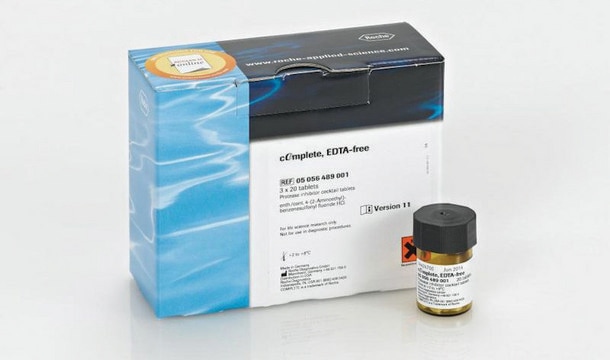추천 제품
생물학적 소스
mouse
Quality Level
항체 형태
purified antibody
항체 생산 유형
primary antibodies
클론
227, monoclonal
종 반응성
human
제조업체/상표
Chemicon®
기술
ELISA: suitable
immunocytochemistry: suitable
western blot: suitable
동형
IgG1κ
배송 상태
wet ice
일반 설명
Protein X (UniProt: P69713; also known as HBx, Peptide X, pX) is encoded by the X gene (Gene ID: 944566) in Hepatitis B virus. Hepatitis B virus (HBV) contains seven main proteins, which include Core, pre-Core, Small S, Middle S, Large S, Polymerase, and the HBx protein. HBx, a multifunctional protein, although not essential for HBV infection, plays a role in silencing host antiviral defenses and promoting viral transcription. It facilitates the efficient replication of HBV by stimulating HBV gene expression from the cccDNA template. It is mainly localized in the cytoplasm with a small fraction detected in the nucleus. However, its expression level can also influence its cellular localization. It is predominantly nuclear when expressed in cells at very low levels but becomes largely cytoplasmic as its expression level increases. In cytoplasm, a minor fraction may also associate with mitochondria. Its mitochondrial targeting sequence is localized in amino acids 68-117. HBx has an N-terminal negative regulatory domain and its transactivation or coactivation of the C-terminal domain is reported to interfere with host cell signaling transduction pathways to help HBV replication. The best-characterized HBx binding partner is the cellular damage-specific DNA binding protein 1 (DDB1) and the interaction of HBx-DDB1 is essential for HBV replication. HBx promotes the degradation of the cellular structural maintenance of chromosomes 5/6 complex (Smc5/6), which directly binds DNA and entraps DNA plasmids. HBx is directly involved in development of cirrhosis and liver and hepatocellular carcinoma. (Ref.: Kornyeyev, D., et al. (2019). J. Virol. 93(16); e00248-19; Hwang, G-Y., et al. (2003). J. Clin. Microbiol. 41(12); 5598-5603).
특이성
Reacts with Hbx-protein (trans-activator X gene product) of hepatitis B virus (epitope recognized - amino acid positions 90-115).
SPECIES REACTIVITIES:
Reacts only with HBV-infected human cells.
SPECIES REACTIVITIES:
Reacts only with HBV-infected human cells.
면역원
Epitope: X-Protein, aa 90-115
Peptide cooresponding to aa90-115 of h HBV-X protein.
애플리케이션
Anti-Hepatitis B Virus Antibody, X-Protein, a.a. 90-115, clone 227 detects level of Hepatitis B Virus & has been published & validated for use in ELISA, WB & IC.
ELISA, immunoblotting and immunocytochemistry staining of infected liver tissues and HBV-transfected hepatoma cells. Optimal working dilutions must be determined by the end user.
Research Category
Infectious Diseases
Infectious Diseases
Research Sub Category
Infectious Diseases - Viral
Infectious Diseases - Viral
물리적 형태
Format: Purified
Liquid in 0.02M PBS pH 7.6, 0.25M NaCl containing 0.1% sodium azide.
저장 및 안정성
Maintain at 2-8°C in undiluted aliquots for up to 12 months.
기타 정보
Concentration: Please refer to the Certificate of Analysis for the lot-specific concentration.
법적 정보
CHEMICON is a registered trademark of Merck KGaA, Darmstadt, Germany
면책조항
Unless otherwise stated in our catalog or other company documentation accompanying the product(s), our products are intended for research use only and are not to be used for any other purpose, which includes but is not limited to, unauthorized commercial uses, in vitro diagnostic uses, ex vivo or in vivo therapeutic uses or any type of consumption or application to humans or animals.
적합한 제품을 찾을 수 없으신가요?
당사의 제품 선택기 도구.을(를) 시도해 보세요.
Storage Class Code
10 - Combustible liquids
WGK
WGK 2
Flash Point (°F)
Not applicable
Flash Point (°C)
Not applicable
시험 성적서(COA)
제품의 로트/배치 번호를 입력하여 시험 성적서(COA)을 검색하십시오. 로트 및 배치 번호는 제품 라벨에 있는 ‘로트’ 또는 ‘배치’라는 용어 뒤에서 찾을 수 있습니다.
HBX causes cyclin D1 overexpression and development of breast cancer in transgenic animals that are heterozygous for p53.
Klein, A; Guhl, E; Tzeng, YJ; Fuhrhop, J; Levrero, M; Graessmann, M; Graessmann, A
Oncogene null
Accumulation of 8-hydroxy-2'-deoxyguanosine adducts in HBx recombinant HepG2 cells and HBx transgenic mice.
Ralph Gehrke, Maria A Brauchle, Kurt Reifenberg, Eberhard Hildt, Uwe Gruetzner et al.
Digestion null
Epigenetic modification induced by hepatitis B virus X protein via interaction with de novo DNA methyltransferase DNMT3A.
Da-Li Zheng, Li Zhang, Na Cheng, Xiao Xu, Qing Deng, Xiao-Mei Teng, Ke-Sheng Wang et al.
Journal of Hepatology null
T M Bui-Nguyen et al.
Oncogene, 29(8), 1179-1189 (2009-12-17)
Metastasis-associated protein 1 (MTA1), a master chromatin modifier, has been shown to regulate cancer progression and is widely upregulated in human cancer, including hepatitis B virus-associated hepatocellular carcinomas (HCCs). Here we provide evidence that hepatitis B virus transactivator protein HBx
KyeongJin Kim et al.
PloS one, 5(3), e8649-e8649 (2010-03-31)
Hepatitis B virus (HBV) is a major cause of chronic liver diseases, and frequently results in hepatitis, cirrhosis, and ultimately hepatocellular carcinoma. The role of HCV in associations with insulin signaling has been elucidated. However, the pathogenesis of HBV-associated insulin
자사의 과학자팀은 생명 과학, 재료 과학, 화학 합성, 크로마토그래피, 분석 및 기타 많은 영역을 포함한 모든 과학 분야에 경험이 있습니다..
고객지원팀으로 연락바랍니다.








